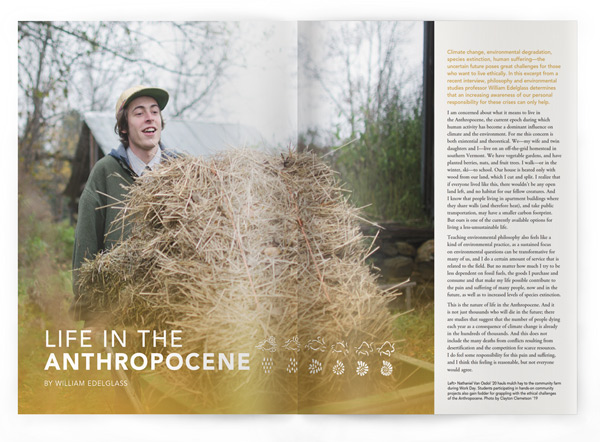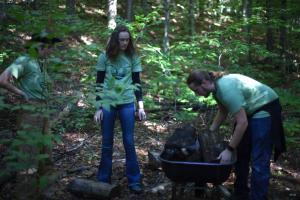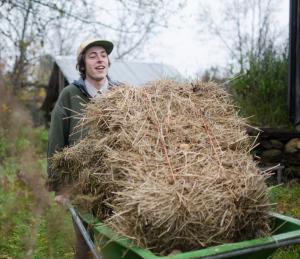Life in the Anthropocene

By William Edelglass

Climate change, environmental degradation, species extinction, human suffering—the uncertain future poses great challenges for those who want to live ethically. In this excerpt from a recent interview, philosophy and environmental studies professor William Edelglass determines that an increasing awareness of our personal responsibility for these crises can only help.
I am concerned about what it means to live in the Anthropocene, the current epoch during which human activity has become a dominant influence on climate and the environment. For me this concern is both existential and theoretical. We—my wife and twin daughters and I—live on an off-the-grid homestead in southern Vermont. We have vegetable gardens, and have planted berries, nuts, and fruit trees. I walk—or in the winter, ski—to school. Our house is heated only with wood from our land, which I cut and split. I realize that if everyone lived like this, there wouldn’t be any open land left, and no habitat for our fellow creatures. And I know that people living in apartment buildings where they share walls (and therefore heat), and take public transportation, may have a smaller carbon footprint. But ours is one of the currently available options for living a less-unsustainable life.
Teaching environmental philosophy also feels like a kind of environmental practice, as a sustained focus on environmental questions can be transformative for many of us, and I do a certain amount of service that is related to the field. But no matter how much I try to be less dependent on fossil fuels, the goods I purchase and consume and that make my life possible contribute to the pain and suffering of many people, now and in the future, as well as to increased levels of species extinction.
This is the nature of life in the Anthropocene. And it is not just thousands who will die in the future; there are studies that suggest that the number of people dying each year as a consequence of climate change is already in the hundreds of thousands. And this does not include the many deaths from conflicts resulting from desertification and the competition for scarce resources. I do feel some responsibility for this pain and suffering, and I think this feeling is reasonable, but not everyone would agree.
Instead of thinking about individual responsibility, one might object, we need to think about climate change as a tragedy of the commons. Instead of holding individuals responsible, then, we should work toward forging agreements that would regulate the commons that is our atmosphere. According to the tragedy of the commons view of climate change, there would be no unilateral obligation to reduce one’s own greenhouse gas emissions. Climate change and other common-pool resource problems, then, would constitute a kind of prisoners’ dilemma, in which individuals acting according to their preferences worsen the situation for everyone. What would be required, then, is an enforceable, collective agreement.

Or, one might object, while it may be the case that cumulatively our actions are catastrophic, no one individual actually causes climate change. This is sometimes called the problem of inconsequentialism: if the consequences of my actions are negligible, and there would be no discernible difference if I drove a low- or high-mileage car, then I am simply not responsible. If my individual choice of a low-mileage car doesn’t really cause climate change, then there is nothing morally wrong with it. According to this view, the only moral obligation we have is to support systemic changes at a policy level by electing and supporting politicians who will implement incentives and regulations that will make a consequential difference.
Clearly, regulation, legislation, and international political agreements are necessary to make significant progress in mitigating and adapting to climate change. Moreover, it can be problematic to hold someone morally responsible for choices that are limited by their economic and social context, in which it may be very hard to make decisions that result in fewer greenhouse gas emissions.
There are also theoretical obstacles to understanding individual moral responsibility in the context of climate change. As Dale Jamieson, a philosopher at NYU, has argued, climate change and other collective-action environmental problems pose a challenge to our traditional conceptions of moral responsibility. Because individually my actions are inconsequential, I intend no harm, and there is no immediate victim, according to the standard account of responsibility I am not responsible for the suffering that results from climate change.
Climate change is thus both a moral challenge and a challenge to moral theory because we find ourselves caught in a situation where together we cause immense suffering and our inherited moral theory has difficulty conceptualizing any moral responsibility. But there are vast numbers of people today who do feel morally responsible. And I think there are ways of conceptualizing moral responsibility that make sense of that feeling. One way is by drawing on the work of Emmanuel Levinas (1906–95), the Lithuanian-French phenomenologist whose account of responsibility turns the standard approach on its head.

In Levinas’s moral phenomenology, responsibility is not grounded in intention and causality. According to most moral philosophies, and our common intuitions, we are responsible for acts that we choose, especially when we understand the consequences of our choices. Likewise, causal responsibility is generally understood to be a necessary, though not sufficient, condition for moral responsibility.
Thus, we generally tend to recognize moral responsibility for acts that are close in space and time, where we see clear connections between perpetrators and victims. In the standard account, because ought implies can, responsibility does not demand more than is reasonably possible for the agent. However, for Levinas, ethical consciousness is precisely the sense of responsibility for the Other, even when I myself have done nothing to harm her. And the more attentive I am the more I recognize my own responsibility.
In a brief autobiographical sketch titled “Signature,” Levinas writes that his life and work were “dominated by the presentiment and the memory of the Nazi horror.” Levinas himself entered the French military and was captured shortly after the start of the Second World War. He spent the next four years in a labor camp in Germany, hearing rumors of the murder of European Jews. His parents, grandparents, both his brothers, and many others close to him were killed by the Nazis; Levinas’s wife and daughter spent the war years hiding in France. For Levinas, the Nazi horror and the goodness of some when confronted by overwhelming force, demanded a radical rethinking of ethics, which became the central philosophical project of his life. It is primarily a project of rethinking our relationship to the other person, which, as he notes, also demands a rethinking of subjectivity.
In contrast to most Western moral philosophies, Levinas’s ethics offers no universal moral principles or prescriptions. He does not seek to answer the questions that animate these traditions, such as: “what is the best human life?”; “how should I live?”; “how ought one to act?”; or “what principles of moral reason can determine what one ought to do?” Instead, Levinas describes the very moral consciousness that precedes and motivates all moral thinking and action. In part due to this approach, then, Levinas’s thought is not in tension with virtue ethics, deontology, consequentialism, or other moral theories; it is operating at a prior level.

Levinas’s phenomenology describes a normative force to respond to the Other, to engage in the world, but there is no particular rule to follow or virtue to cultivate that would be universally applicable. For Levinas, then, there is no escape from the moral dilemmas of social life, for we are incessantly called by a responsibility to address needs that always demand more than the capacities and resources we possess. This will sound familiar to anyone who considers the global crisis of climate change their moral responsibility.
Levinas’s ethics of difference and singularity has been quite influential, provoking increased attention to ethical aspects of social life in a variety of fields in the humanities and social sciences. His work is not, however, generally regarded as an intellectual resource for thinking about environmental issues. But I believe Levinas does have something to offer us in this new era of global crises.
A generation ago, many environmental philosophers and activists tended to ground their work in one form or another of non-anthropocentrism. These views recognized an intrinsic value in nature that made it important to consider nature as a subject of our ethics. The idea that “nature,” as some abstract, ahistorical other to humans and human culture, could be a source of moral obligation is alien to Levinas’s thought. For Levinas, “nature” is precisely that realm which is outside the purview of ethics; it is distinguished instead by its drive to persist and its inability to put the Other before the self as humans are able.
Today, though, many environmental thinkers and activists articulate their concerns using conceptual frameworks that are less reliant on non-anthropocentric metaphysical and ethical views. Indeed, the climate movement, including the intellectual work that motivates it, is now very much a climate justice movement. Levinas’s recurrent concern with “the precariousness of the Other” resonates with this contemporary emphasis on climate justice, with a concern for the ways in which resource depletion and pollution overload harm humans as well as other animals.
The ethical challenges of the Anthropocene call for new approaches and fresh looks at old ones. Levinas’s account of responsibility works well for understanding our moral situation in collective-action environmental challenges such as climate change. More generally, I find Levinas’s phenomenology provides an apt description of ethical life in the Anthropocene: I have inescapable responsibilities that increase with my awareness and are always beyond my capacities to meet. That will not keep me from trying, and learning, and teaching my way into this new epoch.
William Edelglass is professor of philosophy and environmental studies, and co-editor of Facing Nature: Levinas and Environmental Thought (Duquesne University Press, 2012). He co-edits the journal Environmental Philosophy and has served as co-director of the International Association of Environmental Philosophy (IAEP), where he is currently chair of the board of directors. This article is excerpted and adapted from an interview William did on 3:AM.
Unintended Consequences of Growth
 “I found it unbelievable that we rely so heavily on a number presumed to be infinite, Gross Domestic Product (GDP), while we count the extraction of finite resources in its measurement of growth,” says Spencer Knickerbocker ’19, who is completing his Plan in economics. “I also struggled with the fact that the number in no way captures the cost of environmental degradation.” Spencer’s Plan explores the history of GDP, with an emphasis on how using this instrument pushes policy with unintended consequences. He also investigates two alternative instruments to measure societal well-being, and creates his own index that measures elements of economic performance, environmental degradation, and inequality. “I have a growing interest in, and concern for, our future with regards to climate change and resource extraction. It is time for new standards.”
“I found it unbelievable that we rely so heavily on a number presumed to be infinite, Gross Domestic Product (GDP), while we count the extraction of finite resources in its measurement of growth,” says Spencer Knickerbocker ’19, who is completing his Plan in economics. “I also struggled with the fact that the number in no way captures the cost of environmental degradation.” Spencer’s Plan explores the history of GDP, with an emphasis on how using this instrument pushes policy with unintended consequences. He also investigates two alternative instruments to measure societal well-being, and creates his own index that measures elements of economic performance, environmental degradation, and inequality. “I have a growing interest in, and concern for, our future with regards to climate change and resource extraction. It is time for new standards.”
